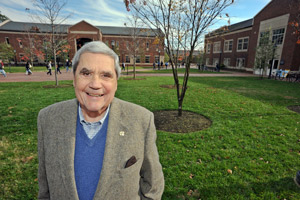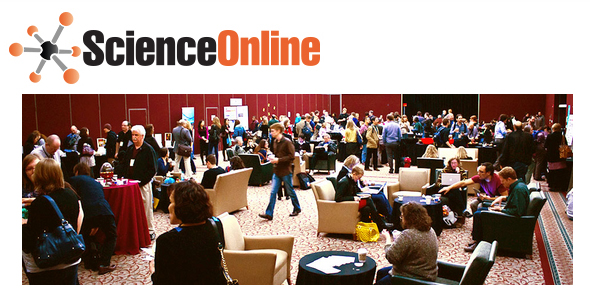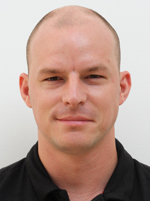The Connection March 2013
The Connection is the newsletter of the Science and Medical Journalism Program at the University of North Carolina at Chapel Hill's Hussman School of Journalism and Media.
A conversation with... Jonathan Howes
 Jonathan B. Howes is a senior public service fellow with the UNC Institute for the Environment. He served as Secretary of the North Carolina Department of Environment, Health and Natural Resources (DEHNR) under Gov. James Hunt and as interim general manager of WUNC radio in 2001 to 2002. In the fall of 2012, Howes and professor Tom Linden co-taught JOMC 562: “Science Documentary Television" in which students produced three reports on North Carolina State Parks for broadcast on North Carolina Public Television. Howes is a member of the advisory board for the Science and Medical Journalism Program in the UNC Hussman School of Journalism and Media. He recently spoke with Dan Lane over the phone to answer questions about his work. A condensed version of that conversation follows.
Jonathan B. Howes is a senior public service fellow with the UNC Institute for the Environment. He served as Secretary of the North Carolina Department of Environment, Health and Natural Resources (DEHNR) under Gov. James Hunt and as interim general manager of WUNC radio in 2001 to 2002. In the fall of 2012, Howes and professor Tom Linden co-taught JOMC 562: “Science Documentary Television" in which students produced three reports on North Carolina State Parks for broadcast on North Carolina Public Television. Howes is a member of the advisory board for the Science and Medical Journalism Program in the UNC Hussman School of Journalism and Media. He recently spoke with Dan Lane over the phone to answer questions about his work. A condensed version of that conversation follows.
Q: How did you first become involved in working with state parks and the environmental issues associated with them?
A: That goes back to the time that I was Secretary of the North Carolina DEHNR — now DENR. I was particularly interested in state parks when I was in that position. I’ve been a user of parks for a long time, and I’ve been impressed ever since I’ve lived in North Carolina with the kinds of resources that the state parks included: from Mt. Mitchell, the highest peak in the Eastern United States; to Jockey’s Ridge, the most important sand dune on the East Coast; the bays and rivers in the eastern part of North Carolina and on and on and on. I talked with Governor Hunt about that when he asked me to be the secretary of DEHNR. I said we needed to do something about our state parks because we had these wonderful assets and we were not taking particularly good care of them. He agreed. To make a long story short, he agreed to support a bond issue for capital improvements in state parks the year after I got to DEHNR, and that was approved by the voters. Then we created a trust fund that provided a steady flow of revenue into the state parks. I ended up chairing the board for that for about 10 years. In the course of that I visited all the state parks. I saw some of the environmental issues they faced, and they’re different from one to the other.
Q: How did you choose which parks to cover in the documentaries this past fall?
A: We asked Lew Ledford, director of the Division of Parks and Recreation, to come over and meet with us. We asked him for his take on which parks presented some of the most interesting issues and the students ended up scoping that out further.
[The students picked Gorges State Park for one of their three reports.] The issue in the Gorges is [that it’s] essentially a rainforest, certainly not a tropical rainforest . . . but of late there have been severe droughts in the western part of the state, causing less water to be in those rivers and affecting the Gorges’ ecosystems.
Eno [State Park] was a totally different issue. The issue in the Eno is an invasive plant, Asian in origin, called hydrilla, which grows in the river [and] displaces other vegetation which might occur there. It certainly changes the appearance and flow characteristics of the river.
The last one was Fort Macon, and that issue has to do with the change in the alignment of the beach and inlet around Fort Macon State Park. How the sands move and how you stabilize the beach were issues that the students explored.
Q: How did you end up working at WUNC?
A: Well that was accidental. I had been a volunteer at WUNC radio and when Bill Davis, then the general manager, left to take a position with National Public Radio in Washington, they asked me if I would go down there for a short time to be interim general manager even though I didn’t know anything about radio except from what I knew as a volunteer. While I was there, I laid the groundwork for the conversion of WUNC from a mixed format classical music and news station to basically an all news and talk station that we have today. That was something that I felt was important because I felt that WUNC was something that could be a really key point of access to information about state government and what was going on around the state of North Carolina.
Q: What advice would you give to a young science writer interested in reporting on environmental issues in North Carolina?
A: We have a number of non-profit organizations which are set up to look after the environment in one way or another. If a student was interested in getting involved, he or she could monitor what they do and report on it. It’s particularly important now because the legislature, which is not generally predisposed to environmental work, is now practically not disposed in that direction at all. The strongest environmental leaders in the General Assembly are gone except for one or two so there’s a lot of work to be done covering these issues, helping the public understand them, and then reporting on what the legislature does or doesn’t do.
First timer goes to ScienceOnline
By Dan Lane
 Labeling ScienceOnline an “un-conference” would be an understatement. When 450 scientists, writers, bloggers and artists converged on NC State University from Jan. 30 to Feb. 2, I expected lots of introductions, plenty of tweeting and passively absorbing the wisdom of a few speakers. I was pleasantly mistaken.
Labeling ScienceOnline an “un-conference” would be an understatement. When 450 scientists, writers, bloggers and artists converged on NC State University from Jan. 30 to Feb. 2, I expected lots of introductions, plenty of tweeting and passively absorbing the wisdom of a few speakers. I was pleasantly mistaken.
The lounge room looked more like a family reunion than a conference. Attendees laughed and drank coffee (lots of coffee), talking as though they were continuing a conversation they had been having all year. Anton Zuiker, one of the founders of ScienceOnline and 2004 graduate of the UNC Science and Medical Journalism Program, says one reason this conference flourishes is that it attracts people interested in talking about science year-round.
“The heart of this community comes from people that have connected online and deepened their connections through further interactions,” Zuiker said. “We’ve read each other’s blogs, linked to each other and through ScienceOnline, we bonded over a shared experience.”
Zuiker, Scientific American blog editor Bora Zivkovic and UNC professor Paul Jones started the Triangle Bloggers Conference in 2005. About 40 people attended. That conference was the seed for subsequent ScienceOnline conferences. This year, two registration periods closed in under a minute. Participants traveled from all corners of North America, Central America, Europe and Australia to attend.
The sessions reflected that diversity. Presenters assumed the role of moderators allowing the audience to share their own ideas on how to properly use metaphors, how to find a good book agent or how to make chemistry less daunting. Live tweeting under the #scio13 hashtag broadened the conversation to include people in other sessions and around the globe. After the sessions, conference attendees who tweeted were able to find one another, and in the spirit of ScienceOnline, pick up the conversation right where they had left off.
Zuiker says he, Zivkovic and ScienceOnline executive director Karyn Traphagen have “worked hard to keep [the conference] familiar.” He says they stress the “value of conversation and respect” throughout the conference.
In sessions, experts listened as closely to newcomers as newcomers did to experts. Curiosity about other disciplines and ideas for new projects flowed throughout the sessions, and continued during meal breaks, at an open mic night and during a Gangnam Style dance party. Some sessions were streamed online to more than two dozen watch parties around the world, from Austin, Texas, to Adelaide, Australia.
This familial attitude and easy conversation have expanded ScienceOnline to more than a conference. In 2012, ScienceOnline became a non-profit organization. ScienceOnline will be putting on two additional conferences this year: ScienceOnline Teen in New York City and ScienceOnline Oceans in Miami.
Zuiker says he did not originally envision ScienceOnline growing to this extent, but he’s pleased to see the conference expand with advances in technology. “It’s great to see more and more science journalists and writers make use of online tools. With more people on Twitter and apps to learn more [about] ourselves, ScienceOnline is more exciting nine years later.”
Update from our second-year master's student
During the previous summer, I was privileged to become the communications intern at the Yale Rudd Center for Food Policy & Obesity. The Rudd Center produces research designed to help inform policies that will reduce obesity in America.
I managed the social media outlets for the Rudd Center, and also produced some written content for its website and internal newsletters. The bulk of my work, however, was to produce a series of videos that would help inform the public about health and nutrition resources available through the Rudd Center and also to raise awareness about some of the issues the Rudd Center focuses on, such as food marketing aimed at children.
Below are links to some of the videos:
- How Sweet It Is!
- Rudd 'Roots Parents: Healthy Schools
- Facts Up Front vs. Traffic Light Food Labeling
My experience at the Rudd Center greatly influenced my work the following semester. I ended up producing an audio story about the role of food in our lives. Food used to be the sole source of energy humans needed for the work of life. Before machines and fossil fuels, we needed food to build shelters, escape predators, and to hunt and find more food. Because of this, food and calories played an incredibly important role in the ways our individual behaviors and our cultures developed. Now, food is abundant and machines do our work. Food’s importance in our lives has fundamentally changed. This audio story explores this phenomenon. The story was produced for Sara Peach’s “Powering a Nation” course, and I had a great deal of help from her and other students in the class.
Now I’m deep into thesis crunch time. After a couple of hiccups, I have a plan to shoot two video stories accompanied by a written piece that I will self-publish online. This story will explore ways people pursue and experience health without subscribing to the commercial health and fitness narrative that focuses on body shape and short-term, individualized practices.
Thanks to Dr. Linden, my classmates, and the support of the med/sci advisory board! I’m excited to see how this project will turn out, and I’m grateful for the guidance and mentorship I’ve received at UNC.
 By
By